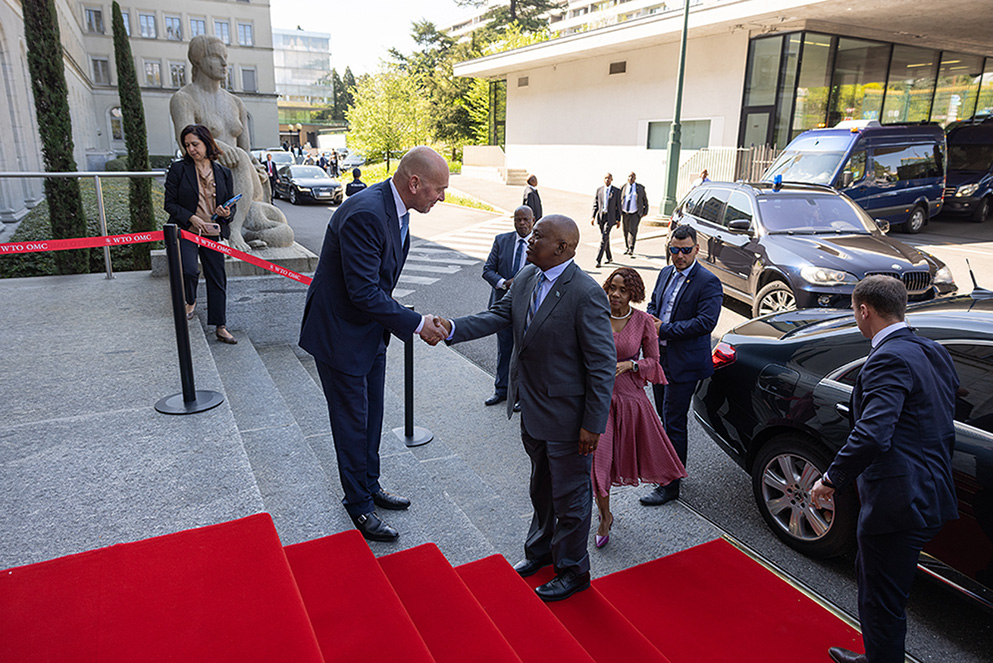PRESIDENTIAL LECTURE SERIES
More
The event was opened by Director-General Ngozi Okonjo-Iweala and attended by WTO ambassadors, Swiss authorities, heads of intergovernmental organizations, representatives of non-governmental organizations, business and academia.
In her opening remarks, DG Okonjo-Iweala underscored that the aim of the WTO's Presidential Lecture Series is “to bring leading voices from around the world to the WTO to share ideas, experiences and policy proposals and to bring fresh thinking to policymakers which they may draw upon in our efforts to use trade to deliver for people and for the planet.”
DG Okonjo-Iweala warmly welcomed President Masisi: “Since taking office in 2018, President Masisi has emerged as an outstanding and thought-provoking leader, recognized far beyond his country's borders.” She also underscored the success achieved by Botswana, a country with less than 0.2% of Africa's population but 1.3% of the value of Africa's merchandise exports.
DG Okonjo-Iweala noted that Botswana — like most African countries — still faces serious challenges in terms of export diversification, creating jobs, improving skills for new generations and achieving growth that is both socially equitable and environmentally sustainable.
“President Masisi's government has already started to answer these questions with its reset agenda, promoting digital technology and job creation for young people, especially through value chain development in key sectors, such as mining, tourism, agriculture and education,” she said.
In his speech, President Masisi stressed the historic outcome of the WTO's 12th Ministerial Conference (MC12) in June 2022, which “brought about a revitalized sense of trust” among members. “It is evident that this renewed spirit of collaboration is essential for the successful functioning of the organization, and I would like to emphasize the importance of implementing MC12 decisions in a manner that is acceptable to all members.”
“Botswana — and I believe Africa at large — recognizes the significance of these outcomes in shaping the future of global trade. Therefore, it is imperative to ensure that the implementation process is transparent and inclusive, taking into account the diverse needs and concerns of all members. Only by doing so can the WTO build a sustainable framework for global trade that benefits all nations, particularly developing countries,” he added.
President Masisi underlined the numerous challenges that have hindered Africa's economic development, noting in particular the impact of the COVID-19 pandemic, which saw an unequal distribution of vaccines, leaving many developing countries struggling to secure enough doses for their populations. “To address these challenges, there is a need for a coordinated global response. The WTO can play a crucial role in assisting developing countries to prepare for future pandemics.”
Underlining that Botswana graduated from least-developed country (LDC) status in 1994, President Masisi stressed that LDC graduation is a complex issue that demands a sensitive and nuanced approach to ensure that the concerns and needs of these countries are adequately addressed.
“It is imperative that the WTO devotes sufficient attention to this matter and takes into account the unique challenges faced by LDCs in their efforts to integrate into the global economy. Important lessons can be learnt from the challenges of landlocked developing countries (LLDCs) such as Botswana who have graduated to middle and upper middle-income status,” he said.
He also highlighted the significant progress towards regional integration in Africa resulting from the establishment of the African Continental Free Trade Area (AfCFTA), aimed at significantly boosting intra-Africa trade, particularly trade in value-added production and trade across all sectors of Africa’s economy. He called on WTO members to “support African countries in their efforts to create a seamless trading system within the continent, and to promote trade between Africa and the rest of the world.”
President Masisi noted that Botswana is a founding member of the WTO Informal Working Group on Trade and Gender, and has been co-chair of the Group together with El Salvador and Iceland. This shows that Botswana is actively working, both at domestic and international levels, to advocate for and promote trade policies and programmes that are gender responsive, he said.
In addition, Botswana has established the National Youth Council, which aims to empower young people and promote their participation in the development of the country. The government has also implemented various programmes to support youth employment and entrepreneurship.
The event closed with a vote of thanks by Ambassador Athaliah Lesiba Molokomme, Chair of the General Council, who expressed the hope that “the conversation held today will stimulate the discussions at the WTO that are critical to shape the future of global trade and trade relations between Africa and the rest of the world.”
A video recording of the event is available here.
WTO's Presidential Lecture Series
Launched in 2022, the lecture series provides a platform for distinguished speakers from all walks of life, ranging from presidents, prime ministers and high-level politicians to business leaders, scientists, authors and philanthropists, to discuss multilateral cooperation and global governance issues, including trade-related matters and sustainable development goals.
The first Presidential Lecture was delivered by Mia Amor Mottley, the Prime Minister of Barbados, in March 2022.
More information on the lecture series is available here.
Share
Share
Problems viewing this page? If so, please contact [email protected] giving details of the operating system and web browser you are using.
